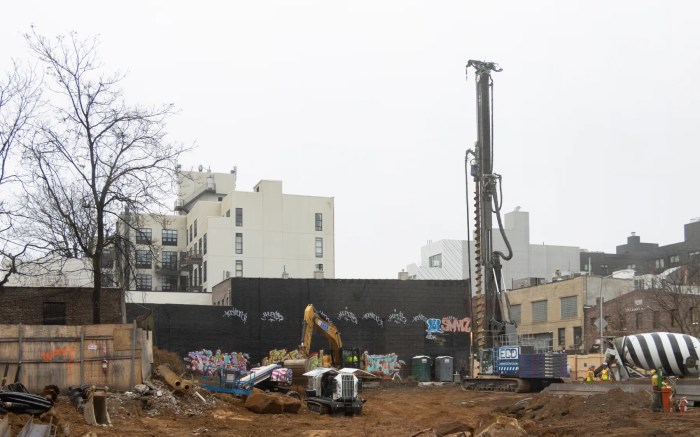BY Aline Reynolds | Chinatown property owners and residents formed a line that spilled onto the sidewalk outside of 250 Broadway on Thursday, May 26, hoping to comment on the Chinatown Business Improvement District, which the City will either approve or deny later this month. They testified in front of the City Council’s Finance Committee — many in support and some in opposition.
The B.I.D., if formed, would consist of a stakeholder-elected board of directors that would arrange for sidewalk cleaning, holiday lighting, snow removal, traffic mitigation, assistance to small businesses and other neighborhood services. The district would be bounded by Broome Street to the north, Broadway to the west, Allen Street to the east, and Madison and Worth Streets to the south.
The B.I.D.’s first-year budget would be $1.3 million, nearly 80 percent of which would be directed to sanitation services, according to the Chinatown Partnership Local Development Corporation, the creator of the B.I.D. proposal. Approximately three-quarters of business owners would pay less than $1,000 annually, while about one-third of them of them would pay the minimum $200 fee. C.P.L.D.C. Executive Director Wellington Chen explained that, contrary to what some B.I.D. opponents believe, the fees are fixed and are not pegged to property taxes. “You can’t add one more dollar unless you want to go through a City Council hearing again,” he said.
The B.I.D. is especially needed now, according to the steering committee, since the government-sponsored “Clean Streets” sanitation program expired on March 31.
District One Councilmember Margaret Chin has been a stalwart supporter of the B.I.D. since its inception.
“The Chinatown B.I.D. is about self-determination and empowerment; about the people of this community coming together to improve the neighborhood,” said Chin. “Supplemental sanitation and cleaning services, along with support for small businesses, will help strengthen Chinatown and Lower Manhattan, and help us make this a community that people want to visit and be a part of even more than they do now.”
More than 530 of approximately 1,000 property owners surveyed are also in favor of the program, according to a B.I.D. spokesperson.
Property owner Michael Salzhauer, co-chair of the steering committee, said businesses have futilely attempted to come together to fundraise, advertise and clean the streets over the years. “We believe that the B.I.D. will give us advocacy and help [our] businesses do additional business,” he said.
“Competition is out there… but we’re not worried. We’ll survive and we will thrive, because I know that the B.I.D. will give us a level playing field with cleaner streets and a more attractive neighborhood. And we’ll do the rest ourselves to grow our business and keep our customers,” said property owner Peter Lau, who has owned and operated two Chinatown pharmacies for 25 years.
B.I.D. proponent and C.B. 2 member Anthony Wong, a resident of 208 Centre St., agreed that the program would help keep Chinatown clean and foster its businesses. “I know people don’t want to turn it into Disneyland,” he said, in reference to commercial growth, “but you have to give a little in order to receive a little.”
Other community members, however, are contesting the B.I.D. on the grounds that it would financially burden small businesses, encourage the infiltration of big-box stores, and promote tourism — the very things residents and small business owners dread.
“The B.I.D. is not about cleaning streets. It’s a grab for power by unelected officials to control the community in the interests of outside developers, who will profit by transforming Chinatown into a tourist destination with high-rise condos, commercial buildings, and big-box stores,” according to neighborhood real estate broker Stephen Cheung, a member of the Coalition against the Chinatown B.I.D.
“Only property owners can vote to form a B.I.D., but the impact is felt by the entire community — mom-and-pop shops, residents and workers,” said Bethany Li, a staff attorney at the Asian-American Legal Defense and Education Fund. The B.I.D., Li fears, would not be sensitive to the needs of the community. “It will accelerate the building of luxury condominiums, high-class hotels and unaffordable boutiques and commercial establishments, rather than promote affordable housing and salvage floundering small businesses,” said Li.
Mott Street property owner Jan Lee, who is also against the B.I.D., has reportedly frozen commercial and residential rents in order to help struggling shops to stay afloat. The B.I.D., he said, would lead to rapid gentrification and to the displacement of culturally significant businesses. “My commercial tenants are directly affected by the double-digit increase in water taxes, insurance hikes, gas and motor fuel costs, and of course, property tax… and now our Council Member Chin and her Chinatown Partnership, after using up seven million dollars of 9/11 recovery money, want to tax my tenants even more,” said Lee.
Another popular complaint among the B.I.D. opponents was the public feedback process. Many testifiers claimed not to have had an opportunity to oppose the B.I.D., either because they weren’t informed of the program, they didn’t know how to petition against it or they don’t speak or write English fluently enough to do so.
The C.P.L.D.C. adamantly defended their outreach efforts.
“We mailed out 71,000 notices to everyone in the B.I.D. district. Most of them were translated,” said Chen.
The steering committee, Chen pointed out, has been scrupulously monitored by the City’s Department of Small Business Services.
“It’s not fair to say we’re withholding information from people opposing [the B.I.D.],” echoed C.P.L.D.C. co-chairman Peter Cheng.
Cheng said he and his team mailed out more than 15,000 notices to Chinatown property owners, business owners and residents, notifying them of the Finance Committee hearing.
Chin echoed theco-chairman.
“You cannot just sit here and say, ‘all these things are not done.’ The information’s been out there for many, many years,” said Chin. “There are problems in Chinatown, but people are trying to come together to do something after 9/11. I think we have to appreciate that effort.”
Opponents now have 30 days from the May 26 hearing to submit objection letters to the City Clerk’s office. The City Council will vote on the B.I.D. on Wednesday, June 29.




































